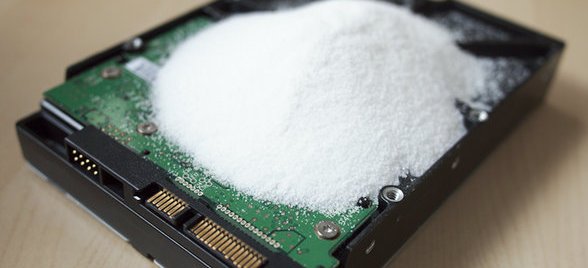Hard drives are six times bigger with seasoning

Cooking fans rejoice: hard drive capacity can be increased more than six fold, and all it takes is a pinch of salt. Wired is reporting that a research team from Singapore has been experimenting with the world's favourite condiment. They've come to the conclusion that sodium chloride can turn a normal 500gigabit/inch drive platter into a massively dense 3.3 tera bit/inch one.
Before you go all Heston Blumenthal on your hard disk, though, it should be added that the salt has to be added at the manufacturing stage and not afterwards. Also, it requires judicious use of high resolution electron beam lithography . And you don't have a high resolution e-beam lithograph next to your Magimix, do you?
The reason for the increased capacity is that the salt additive and lithographic technique cause the magnetic grains which used to store data can be grown to a larger size and arrange themselves in a pattern that allows one bit to be saved per grain. What the impacts of this would be on long term storage – normally groups of grains are used for each bit providing some resilience - haven't been discussed yet.
With the physical limits of today's storage techniquesfast being reached, all manufacturers are looking for new ways to continue increasing drive capacity in line with historical trends – roughly double the space for the same cost every two years. While salt-powered storage is still strictly in the laboratory only, we may start seeing the first 'heat assisted' hard drives – which promise up to ten times current capacity - some time next year.
Keep up to date with the most important stories and the best deals, as picked by the PC Gamer team.

